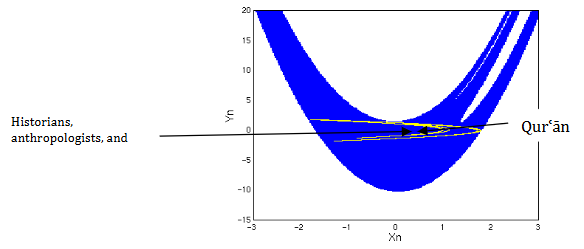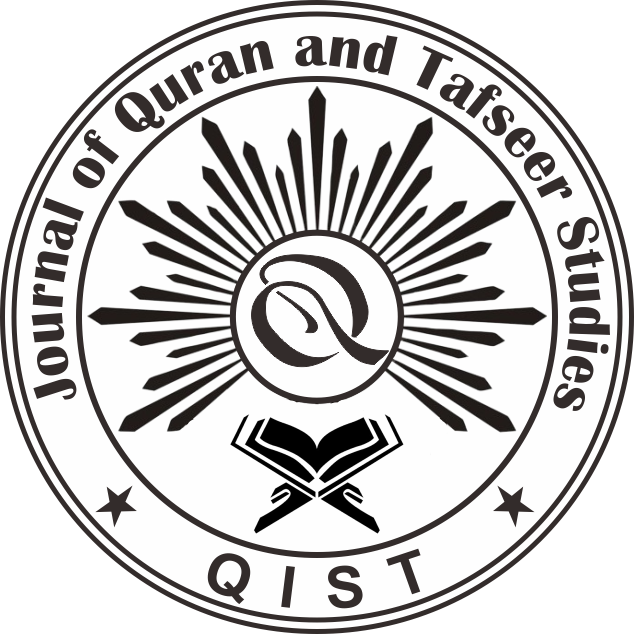Iʿjāz of the Qurʿān for Using the Words Gold, Silver and Not Money
DOI:
https://doi.org/10.23917/qist.v3i3.5131Keywords:
Philology, Art of Reading Well, Iʿjāz, Gold, Silver, MoneyAbstract
The production of knowledge on iʿjāz in economy is strongly influenced by the literature on scientific miracles of the Qurʿān. The interpretation of the verses of the Qurʿān pertaining to maʿāsh comes up against the binary logic aimed at constructing a scientific identity by summoning key concepts from mainstream economic thought. This article is based on philology as an art of reading well to shed light on the iʿjāz of the Qurʿān through the use of the words gold and silver and not that of money. It is structured around multidisciplinary approach and a qualitative analysis through the meanings in reference to the literature on the secrets of eloquence and evidence of the inimitability of the Qurʿān. The results showed that the iʿjāz in the use of the words gold and silver invites to live in the world of rizq, as an umwelt or 風土 fūdo. This mode of existence provides resilience against voluntary servitude to the system of monetary creation ex nihilo by the interest loan granted by commercial banks. Such particular way is a thematic interpretation of the verses relating to the means to acquit the rights of the Creator and those of the creatures. It converges like Hénon attractor as a chaotic fractal set with research in history, anthropology and numismatics which does not use the word money.
References
K. Polanyi, Primitive, Archaic, and Modern Economies. Boston: Beacon Press, 1968, p. 181.
C. Humphrey, "Barter and economic disintegration," Man, vol. 20, no. 1, 1985, pp. 48-72.
J. Schoonheyt, "L'arbre de décisions sur les moyens d'échanges," [The decision tree on the means of exchange], Revue numismatique, vol. 157, 2001, pp. 33-36.
J.K. Galbraith, L'argent [Money]. Paris: Gallimard, 1979, p. 19.
A. Jurjānī, Kitab al-Ta'rifat [a book of definitions]. Beirut: Dar al-Kutub al-Ilmiyah, 1983, p. 31.
E. Braun, Finance Behind the Veil of Money. South Carolina: CreateSpace, 2016.
R.L. Heilbroner, Behind the Veil of Economics. New York: W. W. Norton & Company, 1989.
H. Bergson, L'évolution créatrice [Creative evolution]. Paris: Alcan, 1907, p. 125.
A. Belabes, "A New Foundation of the Phenomenon of Money Through a Systemic Approach to Zakatable Assets," AZKA International Journal of Zakat & Social Finance, vol. 3, no. 2, 2022, p. 9.
M. T. Ben Achour, Al-Tahrīr wa al-Tanwīr [Deepening and Enlightenment]. Tunis: Al-Dar al-Tunusiyah li-l-Nashr, 1984, vol. 13 p. 14.
M. Al-Ṭabarī, Jāmi' al-Bayān fi Ta'wīl al-Qur'ān [Comprehensive Exposition of Interpretation of Verses of Qur'ān]. Beirut: Dar al-Kutub al-Ilmiya, 2013, vol. 7, p. 245.
U. Ibn Jinnī, Al-Khasāis [The characteristics of language]. Beirut: Al-Huda Press, 1954, vol. 1, p. 150.
L. Malot, Le Suicide monétaire [Monetary suicide]. Paris: Maïa, 2023.
A. Plotnitsky, "Mathematical Practice as Philosophy, with Galois, Riemann, and Grothendieck," In: B. Sriraman (eds). Handbook of the History and Philosophy of Mathematical Practice. Cham: Springer, 2022. https://doi.org/10.1007/978-3-030-19071-2_97-1
H. Poincaré. La science et l'hypothèse [Science and hypothesis]. Paris: Flammarion, 1902, p. 49.
A. Connes. Noncommutative Geometry. San Diego: Academic Press, 1994.
M. Butor, Œuvres completes [Complete Works]. Paris. La Difference, 2006, vol. 3, p. 558.
A. Belabes, Compétitivité nationale, archéologie d'une notion et d'un débat [National competitiveness, archeology of a notion and a debate], Ph.D. Thesis in Economics. Paris: School for Advanced Studies in the Social Sciences, 2001.
M. Allais, "Les conditions monétaires d'une économie de marchés: des enseignements du passé aux réformes de demain," [The monetary conditions of a market economy: lessons from the past to the reforms of tomorrow], Revue d'économie politique, vol. 103, no. 3, 1993, pp. 317-367.
B. d'Espagnat, Veiled Reality. London: Routledge, 2003.
M. Kundera, The Curtain. New York: Harper Perennial, 2007.
D. Bohm. On Dialogue. London: Routledge, 2004, pp. 79-82.
G. Deleuze and F. Guattari, Qu'est-ce que la philosophie? [What is philosophy?]. Paris: Minuit, 2005, p. 22.
F. Nietzsche. The Gay Science. Cambridge: Cambridge University Press, 2001, p. 140.
B. Cassin, Quand dire, c'est vraiment faire [When saying is really doing]. Paris: Fayard, 2018.
M. Al-Mubarrad, al-Kāmil [The complete]. Cairo: Dar al-Ghad al-Jadid, 2019.
P. Guillemant, Le grand virage de l'humanité [The great turning point of humanity]. Paris: Trédaniel, 2021.
P.L. Limido, "L'acte de lecture, entre sens et vérité," [The act of reading, between meaning and truth], Cahiers de philosophie de l'université de Caen, vol. 60, 2023, pp. 41-60.
S. Taftāzānī, Al-Muṭawal [The extended]. Beirut: Dar al-Kutub al-Ilmiyah, 2001, p. 706.
R. Girard, "Ce qui se joue aujourd'hui est une rivalité mimétique à l'échelle planétaire" [What is occurring today is a mimetic rivalry on a planetary scale] Le Monde, 5 November 2001, https://cutt.ly/Oer36xhG
M.N. Al-Albani, Sahīh al-Jāmi'. Beirut: Al-Maktab al-Islami, 1990, vol. 1, p. 366.
M. Ibn Qayyim al-Jawziyyah, 'Uddat al-Ṣābirīn wa Zakhīrat al-Shākirīn [The provisions of the patient and the ammunition of the grateful]. Makkah: Dar Alam al-Fawaid, 2009, p. 314.
A. Belabes, "Money and Muslim Philosophers," in J. Tinguely (ed.). The Palgrave Handbook of Philosophy and Money, Volume 1: Ancient and Medieval Thought. London: Palgrave Macmillan, 2024.
V. Mallet. Attracteur de Hénon [Hénon Attractor], https://cutt.ly/Ter4MMiY
A. Grothendieck. Récoltes et semailles [Harvests and sowing]. 1985, p. 57, https://cutt.ly/ueqoSO7F
A. Belabes. The Interaction between Finance and Neurosciences from a Qur'anic Exegesis of Reason beyond the Brain, The Islamic Finance Research Translation Program of the Saudi Central Bank, 2021, https://cutt.ly/Per7sjjE

Downloads
Submitted
Accepted
Published
How to Cite
Issue
Section
License
Copyright (c) 2024 Abderrazak Belabes

This work is licensed under a Creative Commons Attribution 4.0 International License.

















